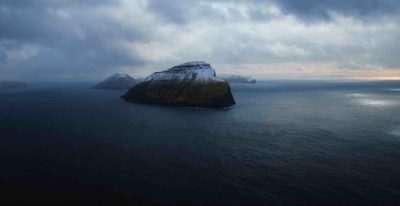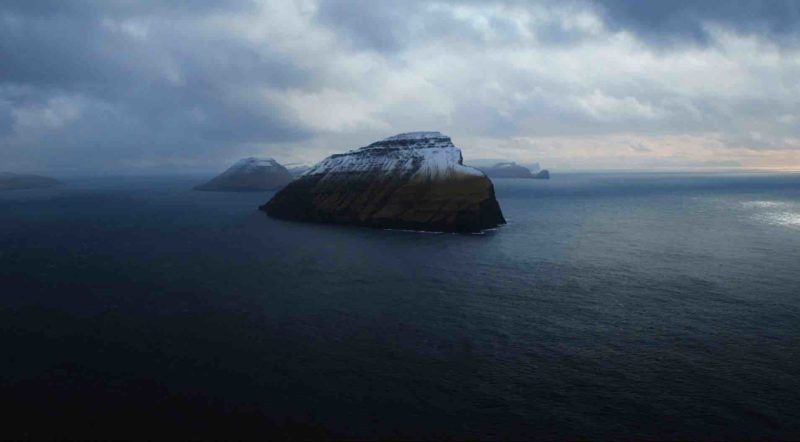INTERVIEW: Faroe Islands come into focus in ‘The Islands and the Whales’

The Islands and the Whales, the new documentary from filmmaker Mike Day, takes a look at the traditional and controversial practice of whaling on the Faroe Islands. The film, which is now playing New York City’s IFC Center, focuses on the people of the islands and their history of looking toward the ocean as a food source.
The documentary examines the issue of whaling less from a should-they-or-shouldn’t-they standpoint and more from an environmental perspective. Whether or not someone agrees with the locals’ killing of the whales is secondary to the overall issue of pollutants, which are poisoning the majestic animals.
Day first became attracted to the idea of documenting the Faroe Islands while filming The Guga Hunters of Ness, a 2011 film. That movie looked at a Scottish community that hunted seabirds in the North Atlantic, and now The Islands and the Whales broadens the storytelling to include the largest creatures of the sea.
Controversial? No doubt. Topical, layered and complex? Without question.
Recently, Hollywood Soapbox exchanged emails with Day about the new film, which won the Grand Jury Prize at DOC NYC and will also be broadcast Oct. 9 on PBS’ POV series. Questions and answers have been slightly edited for style.
What first attracted you to tell this story?
The project drew me in because it sat on this intersection of our relationship with the natural world, in a grey area of a topic often portrayed as black and white. It confounded so many expectations, and it challenged my own assumptions so many times, as it does the audiences’. And that’s my favorite place to be in a film. Demonizing rarely works to move debate forward, and this was a complex tale that was far from what most expected.
Long form documentary gives the space to bridge different worlds like that, to take people out of their echo chamber and into a maybe uncomfortable place that requires independent critical thought, and hopefully gives something that sits with them for afterwards.
How familiar were you with whaling traditions and the Faroe Islands?
I knew about the hunting, but much of what I’d seen online turned out to be nonsense. There were emails going around saying that the hunt was for sport, or a rite of passage, or a festival, or that this species of whale was endangered, and this is just untrue. Equally it was never our aim to condone the hunting but certainly for it to be judged on the facts. For me there was a bigger story from these islands about the dangers of ignoring the warning signs from the natural world.
Do you believe the villagers in the Faroe Islands are misunderstood?
The Faroese population of 48,000 is approximately half urban, living in the capital city Torshavn, and half live in the villages. Like everywhere there is a divide between the city and the countryside; probably more people in the city have stopped eating whale than in the more remote parts of the islands.
But they are a very modern society with the living standards that most the western world has, free health care, free higher education. Their supermarkets are stocked with modern foods from Europe and America. Their life expectancy and level of education [are] very high. They are coming to terms with the fact that their local food sources are, in the case of the seabirds, dying because they are full of plastic from us, and their food chain has collapsed because of environmental changes, and that the whales are riddled with mercury from our coal burning power stations and gold mining.
I think the Faroese and us alike have misunderstood the impact we are having on the natural world.
Were your subjects open to the idea of being in a documentary?
Neither they nor I had any idea what we were getting into! With some of them it came about via drinking Schnapps. The hangover from that lasted a long time for them because we ended up filming for four years, 53 weeks of shooting altogether. But they are very happy with the end result, and all of them are very glad they took part.
For those who cannot understand the practice of killing a whale and perhaps side with the activists, what would you hope they take away from the documentary?
Well, ultimately this isn’t really a film about whaling, and whether you agree with whaling or not, the message that the whales and the islands have for us is that we are all guilty of ignoring the warning signs. And all sides can agree on that. The pollution in the wildlife is coming from us, not from the Faroese. We are the bad guys in this movie.
The whaling is most likely ending in any case. The high levels of toxins the whales are contaminated with generally puts people off eating it. By that measure the hunting should reduce in line with the reduction in consumption, but outsiders going to the islands to try and stop the hunting [have] now made it popular again. I’m sure you can imagine the reaction in America, if a foreign group came from the other side of the world and blockaded pig farms because they believed it was against their beliefs, that pigs are intelligent, and tried to ban hotdogs, regardless of who is right or wrong. It provokes a defensive reaction.
So, I hope people look deeper into the complexities of things rather than just form a knee-jerk opinion, not to say that they need to like whaling, but we live in age of simplified misinformation streams that cause so much harm. And that can create such blindness to what is really going on around us.
By John Soltes / Publisher / John@HollywoodSoapbox.com
The Islands and the Whales is currently playing New York City’s IFC Center, and it will premiere Oct. 9 on PBS’ POV program. Click here for more information.

